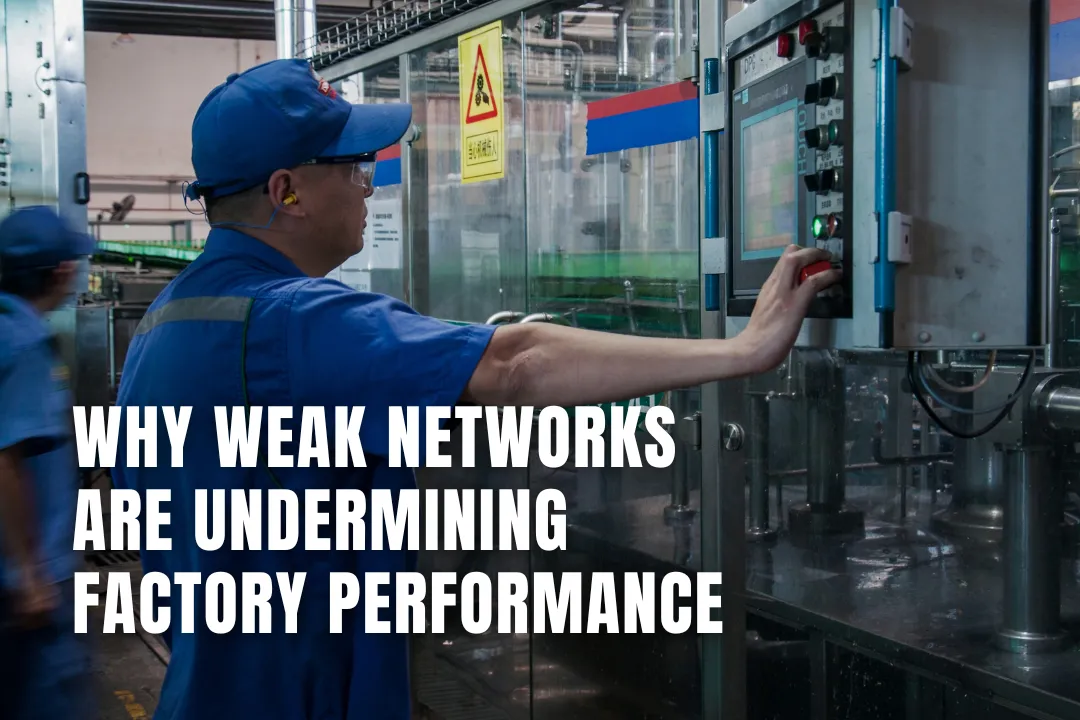Why Weak Networks Are Undermining Factory Performance
July 14, 2025

Factory networks form the digital backbone of modern manufacturing. As operations become increasingly data-driven, network performance has a direct impact on productivity, safety, and profitability. Weak or unreliable connectivity may seem like a minor inconvenience, but over time, it can produce significant operational and financial consequences that often go unnoticed until they escalate.
Key Takeaways On Why Weak Networks Undermine Factory Performance
- The High Cost of Unreliable Networks: Unreliable networks lead to significant financial losses due to downtime, impacting productivity and revenue.
- The Impact on Productivity: Weak networks cause delays and disruptions in production processes, hindering overall efficiency and output.
- The Role of Real-Time Data: Real-time data is crucial for optimizing factory operations, and a robust network is essential for its reliable transmission and analysis.
- The Importance of a Strong Network Foundation: Investing in a reliable network infrastructure is a prerequisite for successful digital transformation and smart factory initiatives.
- The Benefits of a Modernized Network: Upgrading to a modern network provides increased bandwidth, reduced latency, and improved security, enabling factories to leverage advanced technologies and optimize performance.
Register Your LLC
Company Registration
START NOW
Production Delays and Downtime
One of the most immediate costs of a weak network is downtime. Even brief network interruptions can halt machine-to-machine communication, delay automated processes, and disrupt supply chain coordination. In high-throughput environments, a few minutes of lost production can translate into thousands of dollars. Slow data transmission can also delay critical updates from supervisory control systems, increasing the risk of errors or missed maintenance alerts.
Data Loss and Reduced Decision Quality
Factories rely on real-time data to monitor equipment performance, track output, and guide decision-making. A weak network can cause incomplete data collection, transmission errors, or gaps in historical records. When systems fail to sync properly, managers are left to make decisions based on outdated or partial information. This compromises operational efficiency and can lead to overproduction, inventory mismatches, or reactive rather than preventative maintenance planning.
Inefficiency in Mobile Device Usage
Many factories use mobile devices to improve field-level coordination, monitor systems, and streamline reporting. An industrial tablet, for example, is only as effective as the network supporting it. If connectivity is weak in certain areas of the facility, the benefits of real-time access to data and digital workflows are lost. Workers may revert to manual processes or delay tasks until they return to areas with stronger signals, reducing the efficiency gains that mobile tools are meant to provide.
Safety and Compliance Risks
Safety systems in smart factories often depend on uninterrupted connectivity. Sensors, automated alerts, and remote monitoring tools require consistent communication to function correctly. If a network fails during a critical moment, the ability to respond quickly to equipment failures, chemical leaks, or temperature fluctuations is compromised. In addition to endangering workers, weak networks can make it harder to maintain compliance with industry regulations and documentation requirements. Downtime in safety monitoring systems can also delay incident reporting and emergency response coordination. Over time, repeated lapses in connectivity may expose the facility to legal liabilities and reputational damage.
Long-Term Operational Costs
The cumulative effects of weak networks can also impact long-term planning. Factories that experience inconsistent connectivity may be slower to adopt new technologies, such as machine learning-based analytics or advanced robotics, due to concerns about reliability. This limits scalability and places them at a competitive disadvantage. Investments in digital transformation can fall short of expectations if the infrastructure is not stable enough to support them.
Strengthening factory networks is a foundational step in building a resilient and high-performing operation. A reliable connection supports data accuracy, minimizes downtime, enhances worker safety, and ensures that investments in automation and smart devices reach their full potential. Ignoring network performance carries hidden costs that ultimately affect both productivity and profitability. To learn more, look over the accompanying infographic below.


